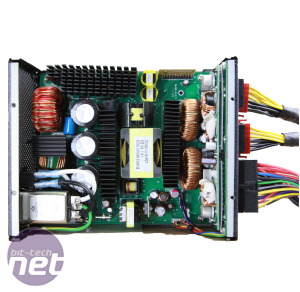
Performance Analysis
While we now use a different machine to test PSUs, many of our past results still identify trends, and offer a good indication of stability and efficiency. The MaxRevo’s 12V rails performed admirably during testing, and all were well within the ATX specification’s minimum and maximum values of 11.4V and 12.6V respectively. At 10 per cent load, all the rails recorded a slightly overvolted reading of 12.26V, with one rail dipping to 12.25. At the same load level, the only other reading that caught our eye was the 3.3V rail; at 3.45V, this was close to exceeding the 3.47V stated in the ATX specification. It was a similar story at 50 per cent load, although the 3.3V rail was much more in line here at 3.38V, with all the 12V rails reading a fraction over 12V.At 100 per cent load, with the MaxRevo drawing a hefty 1,478W from the wall to output 1,335W, the 5V rail dipped to 4.86V and the lowest 12V rail was 11.78V; both these results were well within the ATX specification, however. One issue we were more concerned about, though, was noise. While the MaxRevo’s fan was quiet throughout, the PSU exhibited an annoying electric whine at 100 per cent load.
As expected, the MaxRevo’s efficiency was highest at 50 per cent load, where it was 93 per cent efficient. This dropped to 90 per cent at 100 per cent load, and it was only 85 per cent efficient at 10 per cent load – all these results are very close to those of the Antec High Current Pro 1200.
Click to enlarge
Two additional tests we now carry out are ripple and hold-up. The former is a measurement of the peak-to-peak difference in the amplitude of the 12V waveform supplied by the PSU. All PSUs exhibit ripple to some extent, but we’ll favour results with the lowest values, as high ripple can shorten the lifespan of your components. The ATX specification states a value of 120mV for the maximum recommended ripple, but the most the MaxRevo exhibited was 21.4mV at 100 per cent load. This was slightly higher than that of the Antec High Current Pro 1200.
Meanwhile, hold-up is the length of time a PSU is able to supply power, taking into account small dropouts in the power supplied by the mains. These troughs only last for fractions of a second but can cause issues, so the PSU takes up the slack. The ATX specification recommends a minimum hold-up time of 17ms, and the MaxRevo recorded a time of 31ms on its 5V rail. However, its 12V rail dipped after just 13.5ms. As hold-up time is only a recommendation of the ATX specification, however, so we can’t be too harsh when it comes to this judgment.
Conclusion
The Enermax MaxRevo 1350W is a worthy successor to the Revolution series it’s meant to replace. It's highly efficient, it passed all our stability tests and its other tests results were good too. The whining noise at 100 per cent load is a fly in the ointment, however – other high-end PSUs we’ve tested might have noisier fans, but the MaxRevo’s electrical whine was particularly grating.-
Value12 / 20
-
Design36 / 40
-
Stability40 / 40


MSI MPG Velox 100R Chassis Review
October 14 2021 | 15:04










Want to comment? Please log in.